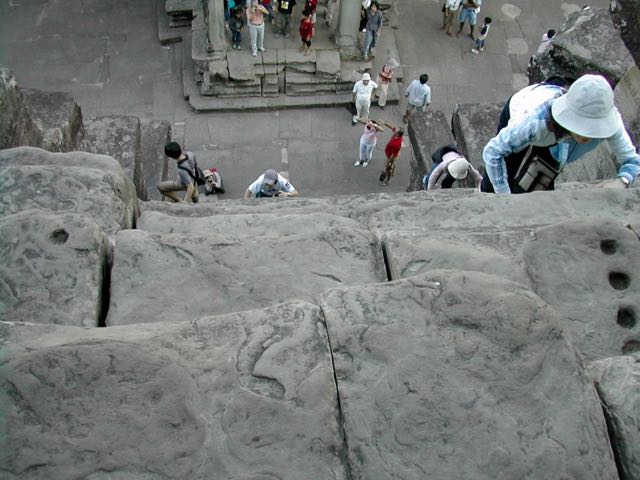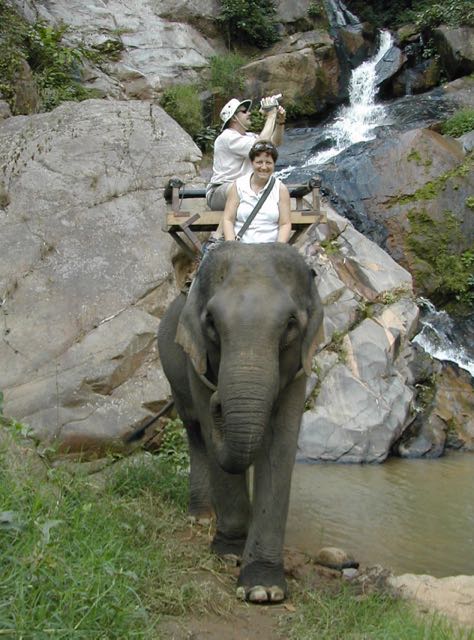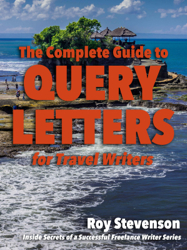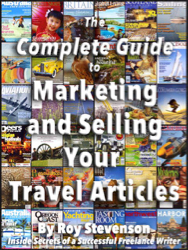Ten Travel Safety Tips
for Travel Writers
By Roy Stevenson
I became aware of the latent dangers inherent in travel when my wife and I sat through an excellent two-day “Personal Security and Safety” course sponsored by her employer several years ago.
As a relatively young buck in my forties at the time, I considered myself a seasoned traveler and thought I knew it all. Boy, was I wrong!
Our trainer, an ex-U.S. Marine Corps consultant, was full of travel safety tips. He quickly made me realize I was a walking target when I traveled. And I learned there were a lot of things I could do to reduce my risks.
When it comes to safety away from home, it’s definitely not a situation where ignorance is bliss. Knowing as much as possible will make you feel more confident while you’re away, and it can even save your life.
 Travel Safety Tip: Please use the handrails. Oh wait, there aren't any handrails!
Travel Safety Tip: Please use the handrails. Oh wait, there aren't any handrails!Obviously, I can’t duplicate a first-rate safety course in a short article. There’s far more to know about travel safety than I can cover here.
So I’ve distilled this list down to my top ten travel safety tips for travel writers.
And toward the end of the article I’ve included some useful websites to help you do your research before you travel abroad.
Here are my top ten travel safety tips:
Dress Down and Look Inconspicuous
When traveling overseas, it’s good to be inconspicuous. Criminals look at foreigners as easy prey because they are dazed, jet-lagged, disoriented, or just plain lost. Don’t make it easy for them to identify you as a foreigner.
Avoid wearing any clothing that screams “American”, like T-shirts or backpacks with U.S. flags, or names of U.S. cities and universities. Avoid wearing sweatshirts and baseball caps of your favorite sports teams.

My favorite headgear is a battered and ridiculous looking white Tilley hat. This hat projects an avid traveler vibe - and not a type of person likely to have excessive wealth.
My traveling uniform varies from a t-shirt to an un-tucked, un-ironed, and crumpled khaki shirt, faded and well-worn pants, and old running shoes. I dress in a slightly less crumpled version of this when necessary.
How you dress sends strong messages to potential robbers and thieves. Dress in plain clothes, similar to how the locals would dress and reduce your likelihood to be a target.
Don’t Flaunt Your Wealth
Even if you’re an average, middle-class person in the U.S., in many other countries you are perceived as rich - very rich. Thieves look for tourists who flaunt their wealth.
Leave your jewelry at home along with expensive watches, and designer clothes and shoes.
Displays of affluence make a criminal’s heart grow fonder. Not only does it tell them you have money, it may also trigger hostility and resentment. Some people really do want what you have, and will go to great lengths to get it.
I once heard some advice to always travel with high-end suitcases. Maybe if you're flying from Boston to Atlanta this won't be a problem. But a designer suitcase marks you as a target in most countries.
If you travel internationally, you know that the criminal onslaught against naïve tourists begins at the airport. That bright and shiny suitcase announces your arrival to the wrong kind of people. Not only does it say you have money and something worth stealing, but it also brands you as an inexperienced traveler and you become prey.
Second- and third-world airports (and even some in the U.S.) are rife with illegal taxi drivers, fake tour and resort promoters, money-changing scammers, black marketers, jewelry store touts, baggage thieves, and more.
Avoid them by blending in, not standing out.
Avoid Parking Garages
When you drive or rent a car, always park in open, well-lit areas. Park as close to your hotel entrance as possible.
Use valet parking if it’s available.
Taxi Tricks
Beware of taxis that are unmarked, no matter where you travel. Often these are unauthorized drivers who plan to charge you ridiculous fares at the end of the journey.
When it comes to taxis, the best travel safety tip is to use the official taxi line at the airport when you arrive. Even if there’s a queue, it’s worth the wait to avoid scams.
At your hotel, use the hotel desk or concierge to arrange your taxi and to ensure you are dealing with a reputable taxi company.
Taxis can trick you in more dangerous ways. If you’re in a country where Americans are kidnapping targets, they’re likely to be at your hotel waiting for you to come out (looking for a taxi). It’s best to skip the first taxi in line, and move on to the second or third.
No matter where you are, always take a good look at the taxi driver, say a few words if you speak the same language, and move on to a different cab if you get bad vibes.
Camera Security & Photographic Hazards
Cameras are required equipment for most travel writers. But they will get snatched unless you take precautions, no matter where you travel.
My travel safety tip for cameras is: when you’re not using your camera, stow it in your bag, out of sight.
Many people foolishly set their camera down on a table when they sit down to have lunch. Leaving a camera sitting on your table at a restaurant is like begging for it to be stolen as soon as you turn your head the other way.
Always keep your camera tucked away in a bag until you need to use it.
 Don't get distracted with photography - especially when you're on top of a rather large elephant, without a seat belt, while it's tiptoeing along the edge of a muddy cliff.
Don't get distracted with photography - especially when you're on top of a rather large elephant, without a seat belt, while it's tiptoeing along the edge of a muddy cliff.Cameras can also be a dangerous distraction by taking your attention away from other hazards around you. When you take photos you momentarily lose track of your surroundings and this alone can be hazardous.
If you are in a place where there are other safety hazards (potholes, cliffs, traffic, rivers with crocodiles, …) be sure someone is with you and watching your back while you photograph.
Another travel safety tip: Don’t go out alone on a photo shoot in a foreign place and never wander out on your own at night - with (or without) your camera equipment.
Safety is more important than getting the shot. If it's dangerous to take a photo, just buy the postcard.
Be Discreet With Maps & Guidebooks
Guidebooks mark you as a tourist. My travel safety tip is to photocopy pages from my guidebook I'll need before I leave home. Then I throw them away once I don’t need them anymore.
Reading a photocopied paper doesn’t scream “tourist” like a guidebook.
I study my maps while I’m in the hotel room so I know where I’m going before I leave for the day.
Which brings up another point: when you’re lost, always look like you know where you’re going. Confidently walk to somewhere safe as if you belong there. You can ask for help or look at your map once you’re off the street.
Get Your Shots

This travel safety tip is for animal lovers. Especially when traveling internationally, there are numerous opportunities to interact with animals, including wild animals that are just too cute.
Have they had their shots? You’ll never know. But you can make sure you’ve had yours.
Certain inoculations are important when you travel. When Linda and I moved to SE Asia we were vaccinated for rabies. We knew there were lots of wild dogs at some of the places we were going and didn't want to take chances. So far, we haven't had any problems but we're happy we had the vaccine.
The CDC has a great website with travel safety tips and all the details. Just select the country you plan to travel to, press “Go” and you will get a complete list of what you need and don't need.
Plan to get your inoculations several months before you travel.
Minimize Alcohol Intake
This travel safety tip is for those of you who enjoy the nightlife wherever you go. Be cautious about your alcohol intake, and never leave your drink unattended.
You need to keep your wits about you when you travel. Having a foggy brain opens you up to more potential problems than you can imagine.
Some of the riskiest places in the world are in and around nightclubs, especially in less developed countries. You multiply your chances of being targeted after dark when you’ve been out drinking.
Just Walk Away
If there are any public disturbances when you’re visiting other countries, walk the other way instead of being nosy and going to see what’s happening. It could be a political protest about to turn violent or a terrorist-inspired incident.
Disturbances are also used as an opportunity by pickpockets and purse-snatchers while you're distracted by other things. Go back to your hotel and watch the action on the news.
If you somehow get into a situation where someone has identified you as American and starts screaming at you, or is doing something inflammatory like burning an American flag, avoid eye contact and slink away.
The worst thing you can do is “puff up” and stick your chest out and start defending the honor your country in the midst of a crowd that might be violently anti-American at that time.
Let someone else with more testosterone and less sense take the heat while you walk away. Let the police or U.S. military deal with it further up the line.
Drop Trouble Spots from Your Bucket List
Avoiding trouble spots around the world is the surest way to survive terrorism and other criminal behaviors. Do not travel to any country that is experiencing political or economic turbulence, no matter how much you’d like to visit that country.
Take into account the country’s economic circumstances when you’re choosing your destinations. The worse off a country is economically, the greater the likelihood of violent crime and tourist scams.
For example, at the time of writing this article, Greece has an unemployment rate of 25%, which has led to destitute locals targeting tourists with all sorts of shakedowns. Greece is still on my bucket list, but I'll wait a while until things improve.
North Korea is another country that I will never see, due to the insanity of its capricious leader. I’ll leave this country to more courageous travel writers who are better equipped to deal with the potential pitfalls and spending time in the custody of fanatical secret police.
It’s easy to find out which countries are safe - or unsafe - for travel. Before you plan your trip, you can find travel safety tips online with the U.S. State Department or the CIA World Factbook websites for background information and travel warnings.
Also consult the international travel warnings issued by the British and Canadian governments. These reports don’t always agree with the U.S. State Department’s assessment, and may paint a better or worse picture, but at least you have more information to work with.
When in doubt about the safety of a country, don’t go.
There are plenty of benign countries that welcome North Americans and westerners, and that don’t have the disconcerting habit of robbing, assaulting, kidnapping, or beheading us.
Some Final Travel Safety Tips
These ten travel safety tips give you a good start of things to be aware of when you travel. Travelers who are alert to their environment are far less likely to fall victim to criminal behavior.
Look confident when you travel. Blend in as much as possible. Don’t flaunt your wealth and always be aware of your surroundings. Do whatever you can to make potential thieves look elsewhere for more lucrative targets.
Recognize potential travel safety and security problems before they happen, and then take steps to avoid them. Travel safely!
Related articles that will interest you:
Trip Planning for Travel Writers
Press Trips for Travel Writers
Travel Safety Tips Part 1: Travel Hazards and Dangerous Destinations

Roy Stevenson is a professional travel writer and the author of www.PitchTravelWrite.com. Over the past ten years, he’s had more than 1000 articles published in 200 magazines, trade and specialty journals, in-flights, on-boards, blogs and websites and has traveled on assignment around the U.S. and to dozens of international destinations.
IF YOU ENJOYED THIS POST, GET UPDATES. IT'S FREE.













